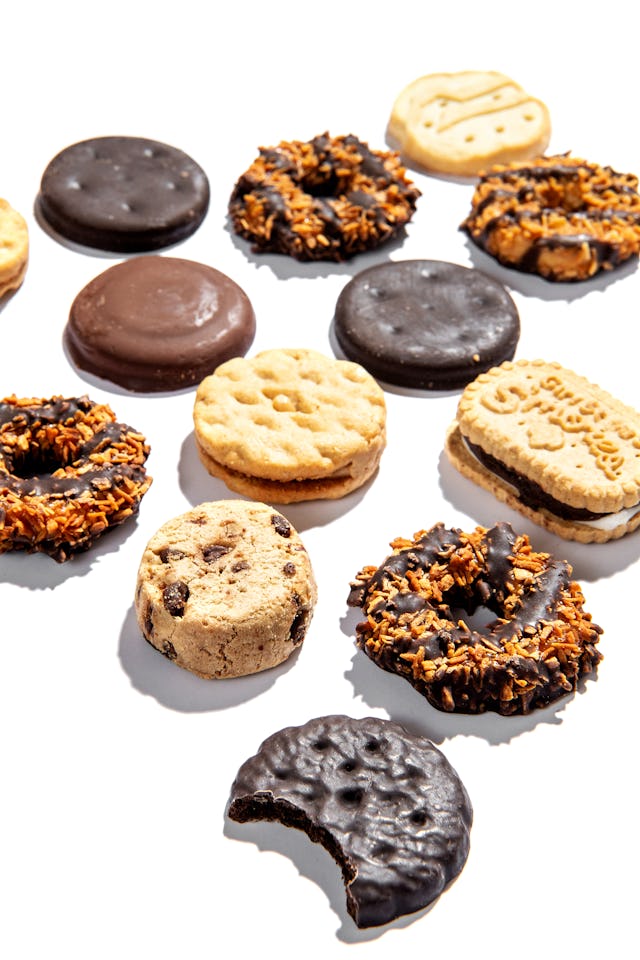What Not To Say If A Girl Scout Asks If You'd Like To Buy Cookies
A mom and disordered eating recovery advocate wants to stop teaching these narratives to girls.

It’s officially Girl Scout cookie season again! That means scanning grocery store parking lots for cookie tables, making room in your freezer for as many Thin Mint boxes as possible, and debating the virtues of Tagalongs versus Samoas.
It’s also the time, though, that very small girls and tweens are unintentionally inundated with diet culture garbage by people who mostly don’t even realize that they’re doing it.
How does it happen? A Girl Scout asks someone if they’d like to buy cookies, and instead of saying, “No, thank you!” they say something subtly nefarious.
“I would love to buy some, but I’m watching my weight!”
“I can’t keep cookies in my house, or I’d eat them all!”
“Do you know how many calories are in those things?”
“I’d have to run a marathon...”
It might not seem like a big deal, but it’s perpetuating a harmful narrative that has been passed down, in large part from women to girls, for generations.
A mom and disordered eating recovery advocate, Nicole Romanella O'Neal, who runs the Monday Dieter account on Instagram, is serious about breaking the cycle. And it can’t happen until we’re aware of what we’re saying when we’re talking to Girl Scouts.
“Please spread this message and share this post,” she wrote in the caption of her now-viral post from January 14. “Our girls are simply trying to sell you cookies. They shouldn’t worry about the calories of the cookies, the diet the person they’re selling to is on, or the body flaw that’s causing a person not to purchase. Diet and body shame is learned. Please please be aware of this when you’re approached. A simple no thank you, is completely acceptable. In fact, it’s perfect. Thank you, from parents of little girls everywhere.”
In the post itself, she writes out a few simple, clear rules in the Notes App:
Don’t mention your diet.
Don’t talk about calories.
Don’t talk about your body flaws.
In addition, she points out how harmful it is to associate buying cookies with weight, to mention binge eating, or to ask which cookies are “healthiest.” They are all sort of entry points to unhealthy relationships with food and even with disordered eating.
What should you say? “No thanks.”
See, isn’t that easy?
O'Neal told Scary Mommy that she wrote the post after attending a Girl Scout cookie kick-off with her 6-year-old daughter.
“They were given scenarios of customers the Girl Scouts might face, and one scenario was the ‘healthy indulgence’ person,” she says. “And they went on to describe that person as someone who was on a diet. As someone who has struggled with disordered eating and poor body image since I was 6, I was triggered. When I got home, I opened my phone, typed out my feelings in my Notes app, and posted. That’s because I don’t want my daughter to be exposed to a world filled with diet, calories, body image constant talk. And I know, that this is one time they can be bombarded with this type of talk. And from my own experience, and my many years in therapy that diet culture and body dissatisfaction are learned, they are not innate.”
Down in the post’s comments, not everyone was receptive, but many agreed that we don’t think enough about what we say to young girls about food.
“Adolescences, especially young girls, are especially sensitive to repeated exposure to diet culture,” one person agreed. “Cookies are treats, ok in moderation.”
“I remember thin women in my family telling me they wouldn’t buy Girl Scout cookies from me because they were dieting,” another women wrote. “A better response would have been ‘no thank you, but good luck selling your cookies!’ These conversations that we do or don’t have with young kids DO matter! To those saying that they don’t, you likely haven’t struggled with body dysmorphia or disordered eating. The things adults say to kids as young as 7-8 years old absolutely have an impact.”
Others in the comments just can’t imagine turning cookies down.
“I will say nothing but give me 12 boxes please,” one person joked.
O’Neal says that the response has been “overwhelmingly positive.”
“People have overwhelmingly shared the message urging everyone to try to keep this in mind as they are approached this cookie season,” she says. “ Especially from former leaders, current leaders, and moms of Girl Scouts who have heard this type of talk for years surrounding cookie sales.”
But there have also been “very negative” comments, as well.
“To those people I say, I’m simply and kindly asking everyone to be mindful around cookie sales because these girls are as young as 5 and we can work together to break diet culture for the next generation simply by saying, ‘No thank you,’” she says.
What’s her best advice for parents navigating raising their kids in a world seeped in diet culture?
“I think not talking so much about looks, sizes, calories, diets, healthy foods, unhealthy foods, restrictions, and weight, using the words fat/thin to describe people, has a huge impact on our girls,” she concludes. “Before becoming a mom, the thing I heard most was, there is no love like the love you have for your child. This is true, but I also realized, no one talks about how much our kids love us. To our young kids, we’re perfect. We point out our flaws. We teach them what imperfections are, and what societal norms are. And if I want to raise a strong woman who loves herself and believes in herself, I need to be a strong woman who loves herself and believes in herself.”